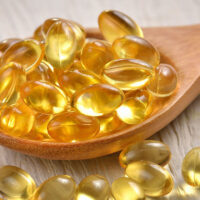L-glutamine is needed by the body to function properly. It is a critical amino-acid and the most abundant in the circulatory system. If so, what is the point in taking supplements with L-glutamine in body sculpting and how does the substance influence muscles?
What is L-glutamine?
Glutamine is an organic compound belonging to α-amino-acids. It is one of the core 20 amino-acids coded by animal and human genes and is contained in a number of proteins. Additionally, the substance makes up 30-35 percent of the nitric oxide in your blood. L-glutamine represents exogenous amino-acids, meaning that it is conditionally essential for the body. It can be produced by the body or delivered from outside. L-glutamine should be supplied from outside sources when under stress or during a disease or physical effort, as then the body uses up bigger amounts of the substance than usual and is unable to produce enough of it to fully supplement the shortages. Additionally, L-glutamine fuels cells of the immune system. Products containing L-glutamine are used with the aim to reduce body mass, as they help burn fat. Plus, they are of aid when developing the muscle tissue.
Bryan Haycock
Glutamine plays an invaluable role in protein synthesis and functioning of the immune system. It is capable of regulating protein synthesis in muscles, and is crucial for maintaining the proper functions of rapidly multiplying cells such as lymphocytes and mucosal enterocytes. Cells of the immune system (e.g. lymphocytes) use glutamine as an anabolic fuel. Additionally, glutamine protects the body against too high ammonia levels, by attaching thereto and releasing it when needed for the production of other amino-acids.
Nonetheless, remember not to overestimate the significance of glutamine for the body, if taken orally as a supplement. Supplementation with glutamine has not been tested enough to clearly confirm its positive effect on muscle building or physical fitness. What is known for certain, however, is that it is of value to athletes who have realistic expectations. If you take glutamine to enhance the functioning of your immune system, during intense training cycles, you will not be disappointed. If you want to make your digestive tract function better, you should also be satisfied.
Will Brink
Manufacturers of sports supplements have started to add glutamine to a number of their products. Athletes include it in their diets. Why? The body needs glutamine for a number of processes. It regulates the functioning of the immune system and the liver and favours integrity of the gastrointestinal tract. Low serum glutamine means loss of muscle mass, with the reserves being used up during intense physical effort.
Due to its potential impact on the immune system, glutamine is believed to help prevent the overtraining syndrome in athletes who train too long and too hard. A number of tests have shown that the level of glutamine can be considered a marker of overtraining. The substance is also used for glycogen reserve restoration in muscles after intense physical effort. Yet, the exact mechanism of the process has not yet been fully explained. Glutamine probably enhances glucose uptake directly by the muscles, or is converted into glucose itself and stored as glycogen.
Another effect of glutamine supplementation can be increased level of the Growth Hormone (GH). In one of the experiments conducted, nine volunteers were given two grams (2,000 mg) of glutamine solved in a cola drink. The bodies of four of them responded to glutamine supplementation with a four-time increase in GH release.
Although no one has ever built impressive muscles only by including glutamine into their diets, the substance is assessed positively as generally beneficial to health. As such, it can be successfully used by athletes. 5 to 20 g daily added to a post-workout shake should be enough.
Zbyszko Tarczewski
Glutamine is considered to be conditionally essential, which means that in certain circumstances, our bodies are unable to produce sufficient amounts of the substance. This fact alone proves glutamine significance for humans.
The amino-acid is used in a number of ways. The major functions of glutamine include its impact on:
- the immune system (glutamine is a fuel for macrophages and lymphocytes); considerable drop in blood glutamine was observed in overtrained subjects; if your immune system does not function properly, you will be unable to work out hard and frequently enough to produce the expected effect;
- glycogen reserve restoration, for higher performance;
- growth in muscle mass, among others, owing to the anti-catabolic effect of the substance or its capacity to increase the nitrogen balance;
- maintaining acid–base homeostasis, by reducing acidification and the resultant storage of glutamine reserves in muscles;
- increase of the GH amounts produced by the body, for enhanced fat reduction.
If dosed properly and combined with reasonable training, glutamine can support your physical activity, which is particularly visible in professional athletes. Regardless of the disciplines they represent, they do feel the effects of glutamine on their bodies.
My opinion is as follows: do not go and buy glutamine if you go to the gym twice a week. But if you are serious about working out, you may be really satisfied with itsefficiency over time.
Sławomir Ambroziak
Glutamine plays a major role in maintaining nitrogen balance. The substance controls protein accumulation and muscle development. As an agent with significant impact on energy metabolism during exercises, it is seen as a performance-enhancer. This effect of glutamine has been confirmed by studies on volunteer athletes, patients, convalescents and animals. The most recent tests, performed on intermediate-level athletes, seem to further confirm that glutamine does work, but the authors are still unable to confirm its effectiveness in this target group.
Opponents of the performance-enhancing effect of glutamine tend to say that: “Glutamine turned out to be a good supplement for the sick and for rats, and to be of no value to those who train recreationally and to athletes”. Is this true? All professional athletes that I know use L-glutamine supplements. “There is no working out without glutamine”, they say.
Let us now have a look at a study carried out by Candow, which is usually relied on by glutamine opponents. The result obtained after 6 weeks of observations in the glutamine group was only by 0.3% better than in the placebo group when it comes to lean mass increase. Referring to clinical trial standards, the authors had to consider the results statistically insignificant. Nonetheless, in practice, for a man weighing 100 kg, the result of 0.3% means c.a. 2.5 kg of pure meat per year!
It must be remembered that an extensive health promoting effect of glutamine has been proved in a number of studies. Not long ago, the substance also surprised the researchers with its ability to effectively burn fat, which was confirmed in tests conducted by several authors, including Prada and Hirabara.




